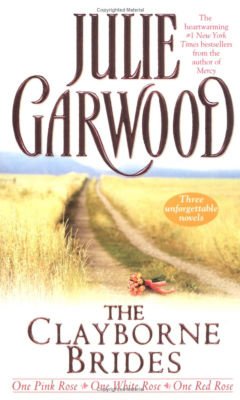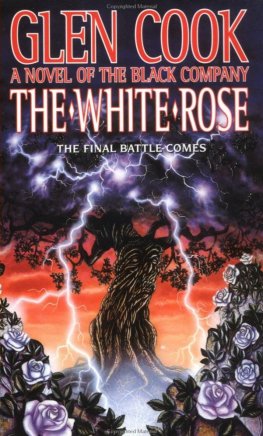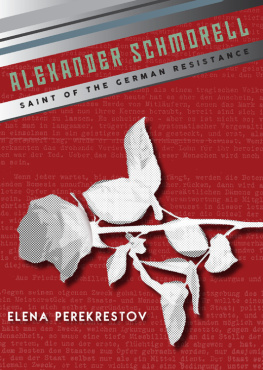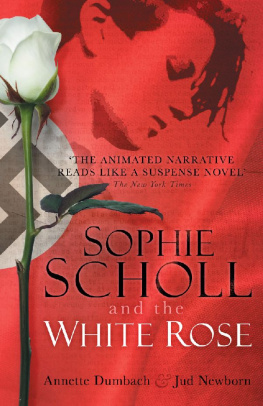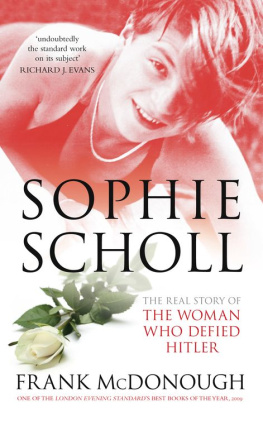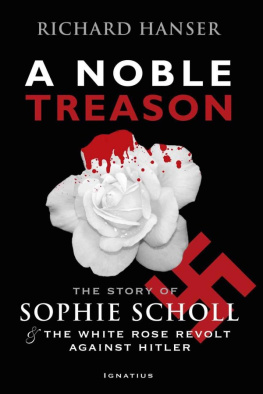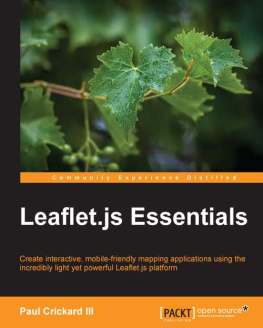THE WHITE ROSE
the
white
rose
Munich 19421943
INGE SCHOLL
With an Introduction by DOROTHEE SLLE
Translated from the German by ARTHUR R. SCHULTZ

Published by Wesleyan University Press, Middletown, CT 06459
www.wesleyan.edu/wespress
1970, 1983 by Inge Aicher-Scholl
Introduction to the Second Edition 1983 by Dorothee Slle
All rights reserved
Printed in the United States of America 20 19 18 17 16 15 14
ISBN13: 978-0-8195-6086-5
All illustrations are the property of the Scholl family. Photos on are by Jrgen Wittenstein.
The first edition of this book was titled Students Against Tyranny. The
original German edition was titled Die Weisse Rose and was published in
1952 by Verlag der Frankfurter Hefte GmbH.
The radio broadcast on herein is translated from: Deutsche
Hrer von Thomas Mann, aus Reden und Aufsatze IIStockholmer
Gesamtausgabe der Werke von Thomas Manncopyright 1965 Katja
Mann.
LIBRARY OF CONGRESS CATALOGING IN PUBLICATION DATA
Scholl, Inge, 1917
The White Rose.
Translation of: Die weisse Rose.
1. Anti-Nazi movementGermany. 2. Universitat MnchenRiot, 1943. 3. Scholl family. I. Slle, Dorothee. II. Title.
DD256.3.S3362 1983 943.086 83-16828
ISBN 0-8195-6086-3
Contents
Illustrations
Introduction to the Second Edition: The Legacy of the White Rose
I recall an overcast early spring afternoon when I climbed over the stone wall that separated our garden from our neighbors. I recall my playmates anxiousness to tell me the news about some university students in Munich who had thrown hundreds of paper sheets from the balcony into the vast entrance hall of the universitys main building. (I guess we did not yet know the word leaflet.) The students were arrested, because the superintendent had seen them do it and promptly notified the police. I was struck by my friend Jrgens words, as I detested the superintendent of my all girls high school, knowing all too well what kind of power he had. I asked Jrgen what was written on the papers. Something against the Fhrer, was his reply. We did not talk about what would happen to these young students, just eight or ten years older than we. Children in Germany in 1943, even if they were as young as we were, knew what would happen. Maybe we fleetingly muttered, KZ, meaning concentration camp, or gleich tot, meaning killed instantly. I do not remember.
At night my parents would listen to the radio broadcasts from Switzerland and the BBC in London. It might have been then that I first heard the name White Rose. But it would take two more years of killing and defending and gassing before we were freed from Hitler, and many more years before we would start to claim our history and discover that at least some Germans, however few, had resisted the Nazis.
I saw Sophie Scholls photograph for the first time during one of these seizures of despair most of us are visited by in our youthful years. I remember telling myself that Sophie was the one friend I needed, and would never meet. Why was I still around? How could anyone in my generation, anyone born in 1929, wish to grow up, after all that had happened in our country? Was it not much more natural to stop growing, as Oscar Drummer, in Gnter Grasss novel, insisted on doing? We had so few people we could trust in as we entered a world of old Nazis and opportunists. Quite a few former refugees returned to Germany, but we felt as isolated in postwar Germany as Sophie and Hans Scholl and their friends once did.
We heard the White Rose portrayed, after the war, as a group of highly idealistic people with little sense of the realities of power and politics. For many years I believed that this was true. Where was their strategy? Whom did they want to reach? What could they hope for? Was it not clear from the very beginning that they were destined to be caught and to die for a besmirched fatherland? Hlderlinone of the great poets of the idealistic epochhad said, For thee, o Fatherland, no one has fallen in vain. Did they not fall in vain? How could one successfully resist Hitler and the military industrial complex of the Alfred Krupps and the I. G. Farbens, armed only with Western political philosophy from Aristotle to Fichte, the words of such classical German writers as Goethe and Schiller, and the wisdom of Lao-tse and the Bible? Sometimes I felt that it was just for us, the next generation, that they had died, preferring death to living under Hitler. I wondered if they died so that we would know there had been at least a few people in Germany, a few students among hundreds of thousands, with a conscience.
I have changed my mind about the so-called youthful idealism of the White Rose, and I would like to explain to the North American reader why it is that now in 1983, forty years after these events, I think differently. When I read their material again, I was surprised to find a clear political analysis in the writings of the White Rose. Their leaflets repeatedly underscored the issue which was to be decisive in delaying the downfall of Hitlers ReichNazi anti-Communism. Along with anti-Semitism, to which it was linked in many ways, anti-Communism was the most virulent force in the Nazi ideology. Millions of good Germans did not like the Nazis, yet thought that they were the lesser evil compared with Communists. These good middle-class Germans, persuaded, by 1933, of the threat of Communism, voted for Hitler, thereby bringing him to power via legal and democratic channels. The conservative Christian parties smoothed Hitlers path to power. Ten years later Germany was a hotbed of robbers and rapists who waged war against all of Europe, while specifically targeting Eastern Europe for their more gruesome atrocities.
The White Rose clearly and justly stated that the first concern for any German should not be the military victory over Bolshevism, but the defeat of National Socialism. Most good Germans in 1943 did not agree with that statement. Some were blind enough to hope that after a military victory over the Bolsheviks the decent forces in Germany, both military and civil, would oust the Nazi party. Germans had thoroughly assimilated Nazi propaganda on the threat of Bolshevism. Yet the White Rose persisted: Do not believe in the National Socialist propaganda that chased the terror of Bolshevism into your bones... It is an historical tragedy that the resistance against Hitler inside the military was paralyzed by Stalins army. Even today, there is little knowledge of the historical facts of the Nazi war against Russia between 1941 and 1945. Many people in Germany (and even more in the United States) do not know who invaded whom in 1941. They do not know that Hitlers army raped and enslaved the Soviet civilian population, nor that they refused to take prisoners of war among Communist functionaries, instead shooting them by order of the Fhrer. Few are aware that twenty million Soviet citizens died in Hitlers war.
Nazi ideology has taken over the minds of people whenever they consider National Socialism to be the lesser evil as against the true enemy, Communism, whenever they see this enemy as the well of all evil, as Hitler did. I recall from my childhood the voice of the great German writer Thomas Mann on American radio. He spoke to usin Germanagainst the crimes of the Nazis, reminding us of our countrys democratic and humanistic traditions. A few years later, during the Cold War, Mann said that anti-Communism is the greatest stupidity of the twentieth century. We have good reasons to recall his statement now.
Next page

